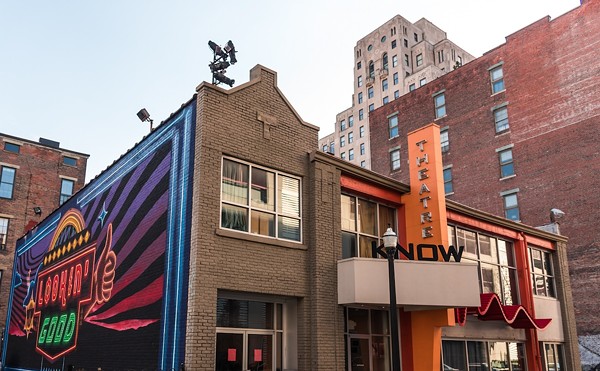The Oxford International Film Festival is about to embark on another transitional year. Now officially called the Cincinnati Film Festival following last year's move south, the fest features its largest slate of films to date (100) presented over nine days (Oct. 8-16) in 11 different venues across the Tristate (primarily at the Esquire Theatre in Clifton but also at such unique spots as the Holiday Auto Theater in Hamilton).
The fest's ambitious expansion extends to this year's collection of 16 full-length films, which features eight documentaries (including Cincinnati native Chico Colvard's Sundance-approved Family Affair and James Franco's Saturday Night) and eight fictional efforts (including local filmmaker Joe Boyd's Hitting the Nuts and actor-turned-director Leland Orser's Morning; see my interview with Orser here), all of which are either world, U.S. or regional premieres.
All of this is happening amid the departure of festival founder J.C. Schroder, who moved to Los Angeles to kickstart his production company last November. Schroder is still involved — he helps program the festival — but the day-to-day duties of executive director have been taken over by Katharine Steele (pictured), a longtime local film supporter who's worked with Underneath Cincinnati and the Southern Ohio Filmmakers Association.
Steele says her involvement, though a big commitment, was a no-brainer.
“I saw the great strides the fest had made in the previous years, and I didn't want to stand by idly to see yet another failed festival in the Cincinnati region after we lost the core team to L.A.,” Steele says. “I had been working on it since November as a part of the new team, and I knew there was a lot that needed to be done to build the structure of the organization.”
The biggest issue is in the area of funding and sponsorships, which has become even harder in the current climate.
“It’s a huge hurdle, especially right now in this economy,” she says. “Everybody’s struggling with the city losing a lot of its arts funding. It was really, really tough this year. Luckily, we’ve had a lot of great partners and venues step up and say, ‘Hey, we know that you guys don’t have any money, but we’d still like to be a part of this, we believe in this and we want to help you any way that we can.’ And so they’ve been very flexible and generous with their space, with their time, with their publicity. That’s one thing I wanted to strive for this year — to make it a community event and get as many people and like-minded organizations involved.”
Then there's the issue of public awareness and interest in the festival, which for a variety of reasons has been spotty since its inception on the Miami University campus in 2007.
“A film fest is a worthy benefit to the city culturally and economically,” Steele says. “The challenge is getting the entire region to see it, too. Looking at other (festival) cities that have grown leaps and bounds like Traverse City, Mich., founded in only 2005 and brings in 80,000 in attendance to its five-day festival and $10 million in economic activity. There's no reason why we can't do that here, but it also had a celebrity champion who founded it: Michael Moore.”
Patience and perseverance is the key.
“People wonder why we don't have something as great as Cleveland's, but that festival has been around for 34 years — something that can't be done year after year without the support of the city, businesses, patrons and the volunteers in their community,” Steele says. “Which is why this year we're spread out. It's a great way to increase visibility and involve areas of our geographically diverse region in an international event. It can also broaden understanding of what a film festival is and can do for our community at large.”
The 2010 CINCINNATI FILM FESTIVAL runs Oct. 8-16 at various venues across the Tristate. Get day-by-day screening schedules at www.cincinnatifilmfestival.com.





